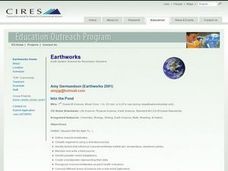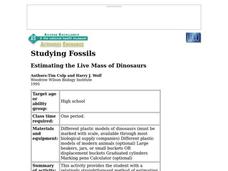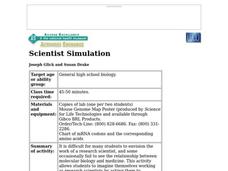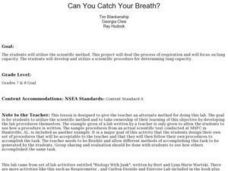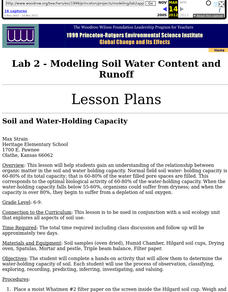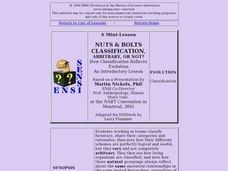Curated OER
Why Don't Whales Have Legs?
Students are given a variety of materials and are asked to design a heat loss experiment that results in a reasonable explanation of "Why don't whales have legs?" students work with the theory of natural selection.
Curated OER
Efficiency Means Getting More for Less
Students measure water and make predictions about efficiency.
Curated OER
Wolf Pack in a Bottle
Learners participate in an activity of a mock electrophoresis using paper chromatography to study DNA and genetic restriction mapping.
Curated OER
Into the Pond
Seventh graders use a pond to explore macroinvertebrates and other organisms. They use a dichotomous key to classify the organisms and maintain a journal recording their findings.
Curated OER
Chesapeake Bay Population Studies
Students determine how to use a quarter meter quadrant to find population density, relative density, frequency and how to calculate a diversity index while participating in a virtual field trip. They study how to establish a Correlation...
Curated OER
Dishing the Dirt Part 3
Students collect and examine different soil samples. They test for specific types of soil elements and the pH level. They answer questions about optimum growing conditions as well.
Curated OER
Dishing the Dirt Part 1
Students create a soil center on their school grounds. They begin to write in their science journals. They participate in an experiment that helps the community begin their own gardens.
Curated OER
Remote Control
Students explore and evaluate several distance learning Web sites. They defend whether or not they would like to participate in the distance learning experience by either writing a proposal for including this distance learning project...
Curated OER
SEPARATION OF A STARCH-GLUCOSE MIXTURE USING GEL FILTRATION
Students make a starch-glucose solution and pour it through gel in order to separate the starch from the glucose. They examine how starch is a larger molecule than glucose and test for the presence of these substances using other...
Curated OER
CULTURING PLANTS FROM EMBRYONIC PLANT TISSUE
Students use this laboratory exercise as a growth medium that contains the macronutrient and micronutrient needs of plants. They observe the effects of different hormones on tissue cultures and must use variations of the basic growth...
Curated OER
Estimating the Live Mass of Dinosaurs
Students calculate the volume of scale model dinosaurs using a water displacement method. They use formulas to calculate the live mass each of the species of dinosaur. Then they complete and discuss a series of questions.
Curated OER
Scientist Simulation
Learners imagine themselves working as research scientists completing the end-steps of a molecular research project and interpreting the data. They compare the gene sequences of normal and abnormal mice and evaluate the protein product...
Curated OER
Estimating the Live Mass of Dinosaurs
Students estimate the live mass of dinosaurs. Using dinosaur and modern animal models, students use simple displacement methods to calculate the volume of the models. They calculate the masses of each model. Students compare the...
Curated OER
Studying Living Organisms
Young scholars discover and discuss the differences between prokaryotes and eukaryotes. Using a microscope, they examine various prepared slides of prokaryotic and eukaryotic organisms.
Curated OER
Plant Biotechnology: Controlling Tissue Differentation
Young scholars demonstrate skills of biotechnology stringent aseptic technique and statistical analysis. They describe hormonal control of plant tissue differentiation and relate this to gene expression. Students observe the effects of...
Curated OER
Culturing Plants from Embryonic Plant Tissue
Student groups use lima beans to represent dicots and corn to represent monocots, soak the seeds, and separate the embryos from the cotyledons. They then place the seeds in Petri dishes in agar and observe for at least one week recording...
Curated OER
Can You Catch Your Breath?
Students apply the the scientific method to an investigation.They develop and perform a scientific procedure for determining lung capacity. In addition, they write a report to display information and share their procedures with the class.
Curated OER
Cave Painting in the Ice Age
Students take notes and sketch during the Internet research. They take notes of the colors found in the cave paintings (black, browns, ochre, sienna). They create an initial full size comprehensive sketch on scrap paper and in their...
Curated OER
Seeing Cells
Sixth graders study living cells and their functioning units. In this cell lesson students color cell diagrams, answer questions and discuss the differences between plant and animal cells.
Curated OER
Heat Transfer and Pollution
Students perform computer simulations on air dispersion. In this chemistry lesson plan, students calculate energy transfer based on specific heat and temperature change. They explain the causes of smog.
Curated OER
Permeability of Earth Materials
Students observe and classify the permeability of a variety of materials.
Curated OER
Human Evolution
Students make and use observations of Laetoli footprints to provide clues to life in the past. They collect and analyze data to study the relationship between foot length and body height.
Curated OER
Nuts & Bolts: is Classification, Arbitrary, Or Not?
Students, in groups, classify furniture, share their categories and rationales, then note how their different schemes vary, perfectly logical and useful, but completely arbitrary.
Curated OER
Testing Soils for Garden Planting
Sixth graders collect soil samples and record the location of the samples by using GPS.
Other popular searches
- Biology Lab Photosynthesis
- Enzyme Biology Lab
- Biology Lab Microscopes
- Biology Lab Safety
- Biology Lab Skills
- Biology Lab Protocol
- Biology Lab Safety Lesson
- Biology Lab Energy
- Introduction to Biology Labs
- Biology Lab Skills Lesson
- Biology Lab Sskills
- Enzyme Biology Lab Pectinase





